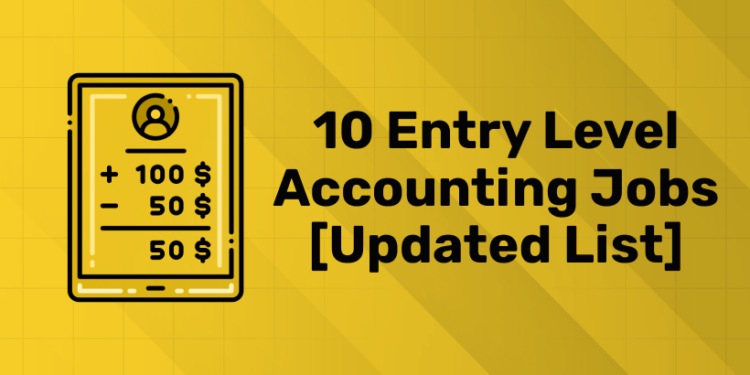Table of Contents
Accounting involves the preparation and review of financial documents for businesses, nonprofit organizations, and government agencies. This requires an understanding of laws and regulations related to finance. Accountants help owners and executives analyze and evaluate risks and identify areas of concern. A high-performing entry-level accountant should be computer literate and familiar with key accounting skills.
Accounting work could also focus on ensuring that taxes are paid in full and on time. This means keeping accurate financial records and calculating the tax burden. Accountants are also responsible for preparing and submitting necessary documents to the Internal Revenue Service (IRS) or other government agencies.
Some accountants consult with executives and managers by suggesting solutions and methods to improve the financial health of the company. Understanding best practices and gaining experience in the financial industry will allow you to advance in this field.
Become a Skilled Accountant – Join Our Accredited Accounting Course Now! Get free Demo Here!
Entry Level Accountant Responsibilities:
- Keeping records of assets and liabilities.
- Updating accounts payable.
- Help with balance sheets and profit and loss statements.
- Help with the revision of income and expenses.
- Preparation of regular reports.
- with other accounting related duties.
Entry Level Accountant Requirements:
- Requirements for entry accountants:
- High school qualification.
- Good organizational skills.
- Excellent numerical and analytical skills.
- Knowledge of accounting and financial reporting.
- Knowledge of MS Office and knowledge of computer software (eg SAP).
Top Entry-Level Accounting Jobs
Now that you know the best industries for accountants, let’s discuss the best entry-level accounting jobs for individuals just starting their careers:
Tax Associate
A tax associate is a professional who works in the tax department of a company, accounting firm or government organization. They are responsible for preparing and filing tax returns, researching tax laws and regulations, ensuring compliance with those laws and regulations, and providing tax advice to clients or internal stakeholders.
This is typically an entry-level position and offers new accounting professionals a great opportunity to gain experience and develop their tax law skills. They usually work under the supervision of senior tax professionals and may eventually progress to senior positions such as tax managers.
Responsibilities
- Assistance in the preparation of tax planning strategies
- Processing of tax returns and financial statements
- Filing taxes electronically with the IRS
- Communicating with clients via phone or email to resolve questions regarding the status of their filing, sources of income and deductions to which they are entitled.
Skills needed for the job
- Excellent verbal and written communication skills
- Knowledge of applicable tax laws and regulations
- Experience with accounting software (such as QuickBooks)
- Excellent analytical and time management skills
- Great attention to detail and ability to meet deadlines
Staff Accountant
The accountant is generally responsible for recording, classifying and summarizing financial transactions, as well as for audits and consultations. Like tax associates, accountants may also be responsible for ensuring compliance with tax laws and regulations.
Additional duties include recording financial transactions such as sales receipts or purchases by debiting the appropriate account using double-entry bookkeeping methods and providing supporting documentation when necessary (eg invoices, statements). Staff accounting is an excellent entry-level accounting job for someone with a strong interest in bookkeeping.
Responsibilities
- Recording of financial transactions in journals and ledgers
- Preparation of balance sheets, profit and loss statements and other reports
- Classification of costs and revenues in the relevant items
- Investigating discrepancies and preparing to correct records
Skills needed for the job
- Good communication and interpersonal skills
- Knowledge of the principles of double-entry accounting
- Experience with accounting software (such as QuickBooks)
- Ability to meet deadlines without compromising quality of output
Financial Analyst
A financial analyst is responsible for assessing a company’s financial health and providing advice on how to improve it. They may also be involved in investment analysis, portfolio management, forecasting and risk assessment.
Responsibilities
- Analysis of the company’s financial situation and recommendations on how to improve it
- Preparation of detailed reports on the company’s financial performance
- Evaluating the risks and benefits of investments and recommending which ones to make
Skills needed for the job
- Knowledge of accounting and financial principles
- Strong quantitative skills
- Strong analytical skills and attention to detail
- Ability to think strategically about business problems
Payroll Administrator
As the name suggests, the payroll administrator is responsible for managing the payroll in the company. This includes calculating and disbursing employee wages, preparing employee paychecks, processing taxes and other withholdings, keeping accurate records of payroll transactions, and resolving issues that arise with rewards or benefits after they are paid. This is a great entry-level accounting job for someone interested in working closely with an organization’s human resources (HR) and finance teams.
Responsibilities
- Managing the company’s payroll system and ensuring its smooth operation
- Preparing employee paychecks and accurately recording them in spreadsheets or databases as required by law
- Keeping accurate records of payments made to employees, including bonuses, holiday pay and more
- Ensuring compliance with applicable laws and regulations, such as labor and tax laws
- Resolving employee inquiries and payroll issues
Skills needed for the job
- Knowledge of payroll and HR processes and regulations
- Good knowledge of working on a PC, especially Microsoft Excel
- Excellent attention to detail as mistakes can be costly to the company
Accounts Payable Specialist
The company’s overall cash flow is managed by two positions, the first of which is the Accounts Payable Specialist.
The Accounts Payable Specialist is responsible for the cash outflow and ensures that all invoices received by the company are processed and paid promptly – the “yang” of the organization’s financial transactions. They may also be responsible for reconciling supplier statements and investigating and resolving any discrepancies. This is a great opportunity for someone looking to start their career in accounting with plenty of opportunity for progression.
Responsibilities
- Fast processing of all invoices received by the company
- Payment of approved invoices quickly and accurately
- Answering and resolving vendor inquiries
- Reconciliation of supplier statements and investigation of possible discrepancies
Skills needed for the job
- Knowledge of accounting processes and procedures
- Knowledge of working on a PC, especially Microsoft Excel
- Excellent data entry skills
- Knowledge of accounting tools such as QuickBooks
Unlock Your Accounting Potential – Enroll in Our Comprehensive Course Today!
Accounts Receivable Clerk
On the other hand, the accounts receivable officer is responsible for cash flow and keeps accurate records of all money owed to the company by its customers – the “yin” of the company’s financial transactions. They may also be responsible for invoicing, tracking late payments and dealing with any customer queries. This is a solid opportunity for someone who wants to start their career in accounting and gain experience working with customers.
Responsibilities
- Keeping accurate records of all monies owed to the company by its customers
- Issuing invoices and collecting overdue payments
- Resolving customer inquiries and disputes
Skills needed for the job
- Good knowledge of accounting processes, tools and procedures
- Knowledge of working on a PC, especially Microsoft Excel
- Excellent math skills
- Excellent attention to detail
Bookkeeper
The bookkeeper is responsible for keeping accurate records of financial transactions within the company, including receipts and payments. They may also be involved in preparing accounts payable and receivable reports and reconciling bank statements to ensure all balances are correct. This is a great entry-level accounting job for someone looking for job stability, growth opportunities and flexibility.
Responsibilities
- Keeping accurate records of financial transactions within the company, including sales and purchases made by customers/suppliers etc., for easy access by management when required.
- Preparation of accounts payable and receivable reports at least monthly (more often if necessary)
- Reconciling bank statements with internal systems to ensure all balances are correct
Skills needed for the job
- Knowledge of accounting processes and procedures
- Experience with accounting software (such as QuickBooks)
- Knowledge of working on a PC, especially Microsoft Excel
- Detail oriented skills are required
- Good with billing
Auditor
The auditor is responsible for reviewing the company’s financial statements and ensuring their accuracy. They may also be involved in identifying areas where financial controls could be strengthened to reduce exposure to risk, as well as preparing reports detailing their findings and recommendations. Any fraud is also reported to the authorities.
Responsibilities
- Reviewing the company’s financial statements and ensuring their accuracy
- Identifying areas where financial controls could be strengthened to reduce exposure to risk (such as fraud)
- Preparation of reports detailing their findings and recommendations based on such checks/audits carried out at regular intervals
Skills needed for the job
- Knowledge of accounting processes, tools and procedures
- Analytical thinking, problem solving and communication skills
- Knowledge of working on a PC, especially Microsoft Excel
- Eye for detail
Budget Analyst
The budget analyst is responsible for ensuring that the company’s financial resources are used efficiently. They may also prepare reports detailing their findings and recommendations based on these reviews/audits conducted at regular intervals throughout each fiscal year. This is a great opportunity for someone who wants to advance their career especially in budgeting.
Responsibilities
- Checking the company’s accounts and ensuring their accuracy
- Identifying areas where financial controls could be strengthened to reduce exposure to risk (such as fraud)
- Preparation of budget proposals and monitoring of total expenses
Skills needed for the job
- Knowledge of accounting processes and procedures
- Knowledge of working on a PC, especially Microsoft Excel
- Strong analytical and mathematical skills
- Ability to plan and solve problems
Tax Preparer
The tax preparer is responsible for preparing and submitting income tax returns. In order to ensure that their clients are paying the correct amount of tax, they will need to be up-to-date on all the latest changes to the tax code. This is an excellent entry-level accounting role for someone who wants to help businesses meet their tax obligations, minimize their tax liabilities and stay compliant with tax laws.
Responsibilities
- Use specialized software to calculate tax liability and prepare tax returns
- They update themselves on changes to the tax code to ensure their clients pay the correct amount of tax
- Providing advice on tax planning strategies and representing clients before tax authorities
Skills needed for the job
- Good knowledge of accounting processes and procedures
- Knowledge of working on a PC, especially Microsoft Excel
- Excellent knowledge of taxes and regulations
How to prepare for an entry-level role in accounting
1: Accounting provides information on
If you’re ready to start a career in accounting, follow the steps below to lay a solid foundation.
1. Get an accounting education.
While some entry-level finance positions require only a high school diploma, employers often prefer candidates with additional education. This may mean taking some college accounting or online courses that demonstrate an interest in finance.
Entri’s Business Accounting and Finance Certification Programme is the ideal choice for aspiring accountants and finance professionals. Covering fundamental principles to advanced topics, the course offers hands-on assignments. With stress on TallyPrime and Excel, you will earn practical skills. Specialisation in UAE Accounting & Finance, insights into taxation, banking, corporate law, and labour law are provided.
2. Gain accounting experience.
To gain accounting experience, consider volunteer opportunities, short-term contract work, entry-level positions with on-the-job training, or an internship. The average salary for a paid accounting intern in the US is $46,362 per year, according to Glassdoor. An unpaid internship can sometimes lead to a full-time job at the same company or another business looking for a candidate with workplace experience.
As an intern, you may be responsible for assisting the accountant with tasks including calculating taxes and preparing tax returns, organizing financial records and maintaining all financial statements.
3. Build accounting skills.
Improve your employability by acquiring skills that demonstrate your knowledge of the latest accounting practices, technologies, strategies, principles, concepts and industry trends. Browse current accounting job openings to find out which skills are required for entry-level jobs and which skills will help you advance your career.
4. Build a professional network.
Start networking with professionals you have a relationship with to begin your entry-level accounting job search. Networking can mean attending social events hosted by your local chamber of commerce in person, or you can network online through sites like LinkedIn or Facebook.
5. Update your job search materials.
To land your first professional accounting position, take some time to update your resume, list of professional references, and cover letter template. List any online courses you’ve taken, other relevant training or experience, and keywords that show you know what to expect in the position.
When applying for entry-level positions, include workplace skills such as attention to detail and high integrity, as well as technical skills such as computer and math skills.
6. Apply for jobs.
View current accounting job openings in your chosen field or industry and start applying for positions that align with your career goals. Be sure to review each employer’s “About Us” section of their website along with the expectations of the position. If you agree with their values and mission, you’re more likely to enjoy the job and be better equipped to help them in a finance-related role.
Take Your Career to New Heights with Our Professional Accounting Course! Get free Demo Here!
Placement Oriented PWC Business Accounting Course
PWC Certified Business Accounting Course by Entri App: Master in-demand skills, ace interviews, and secure top-tier jobs.
Join Now!Frequently Asked Questions
What is the lowest level of accounting job?
The first level of all accounting teams is bookkeeping and clerical duties where accounting clerks and assistants oversee inputting data and checking for errors.
What is the easiest accounting job?
The easiest accounting field often depends on an individual’s aptitude and interests, but many find that basic bookkeeping and accounts payable/receivable roles tend to be relatively straightforward entry points into the accounting profession.
Can a fresher become an accountant?
Entry-level accounting jobs provide an excellent opportunity for fresher candidates to kickstart their careers in the financial industry. These roles offer valuable hands-on experience and the chance to develop vital skills required for success in the accounting field.












